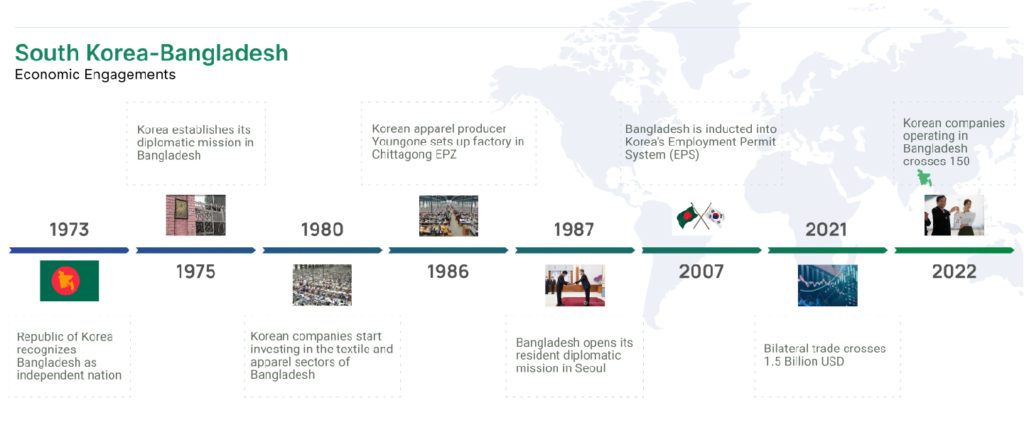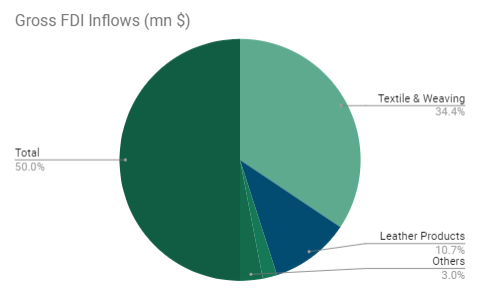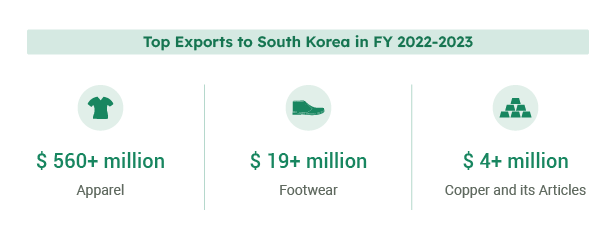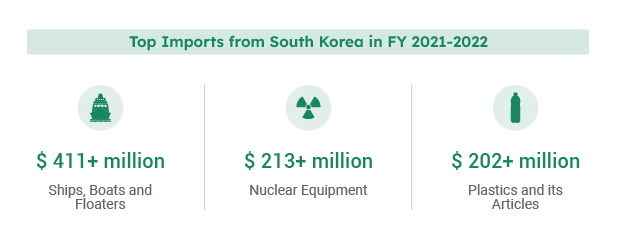The diplomatic relationship between Bangladesh and the Republic of Korea (ROK) has evolved into a robust partnership since its establishment on 18 December 1973. This relationship is underscored by a range of activities, trade interactions, foreign direct investment (FDI), and policy agreements that have contributed to closer collaboration between both countries.
Notably, Bangladesh opened its diplomatic mission in Seoul in 1987, reinforcing their commitment to diplomatic engagement. Additionally, the induction of Bangladesh into the Employment Permit System in 2007 facilitated worker mobility and employment opportunities for Bangladeshi citizens in Korea. A notable number of South Korean expatriate workers are also employed in different companies in Bangladesh as experts.

The Republic of Korea’s investment in Bangladesh has significantly contributed to the latter’s economic growth. In 2022, Bangladesh received a net FDI inflow of $312.94 million, representing 9.0% of the total FDI inflow for the year.
As of December 2022, the cumulative FDI stock reached $1.45 billion, highlighting Korea’s sustained commitment. Korean companies began investing in Bangladesh in the early 1980s, with a focus on sectors such as textile and apparel.
As of 2022, more than 150 Korean companies have established a substantial presence in Bangladesh, across various sectors. Youngone Bangladesh Limited, one of the largest exporters in the sector, has invested a cumulative USD 600 Million since their journey in Bangladesh, Top 3 sectors in terms of Gross FDI Inflow from Korea were Textile & Weaving(454.98 MN USD), Leather Products(141.35 MN USD) and Banking (25.52 MN USD).
Korean company Samsung has established a manufacturing plant in Narsingdi through OEM Fair Group where mobile phones, refrigerators, televisions, air conditioners, microwave ovens and washing machines are being manufactured.
Alongside, the country is considering introducing big Korean companies such as Samsung and Hyundai to Bangladesh to engage in construction, engineering, electronics, and autos as Bangladesh improves its investment environment and expands its market base.

The trade statistics underscore the depth of economic collaboration between the two countries. During July ‘22 to June ‘23, Bangladesh’s total exports to Korea amounted to 623 million USD. Top exported items included Readymade Garments, Footwear, Copper and articles thereof, and articles of leather.

On the import front, Bangladesh’s payments to Korea for FY 21-22 totaled around $1.5 billion. Key imports encompassed Ships, Boats & Floaters, Nuclear Equipment, and Plastics and Articles thereof, and Iron & Steel.

South Korea has emerged as a major trading partner for Bangladesh. After a decade of stagnation, bilateral trade surged to a record high of over $1.5 billion in 2021. This growth can be attributed to the preferential market access provided by the South Korean government to Bangladeshi products, covering an impressive 95% of tariff lines. This access has propelled the trade volume and enhanced economic collaboration between the two countries. Bangladesh and Korea are also a part of the Asia Pacific Trade Agreement (APTA), a regional trade agreement to facilitate bilateral trade between the two.
Contact us for a comprehensive understanding of the investment landscape in Bangladesh